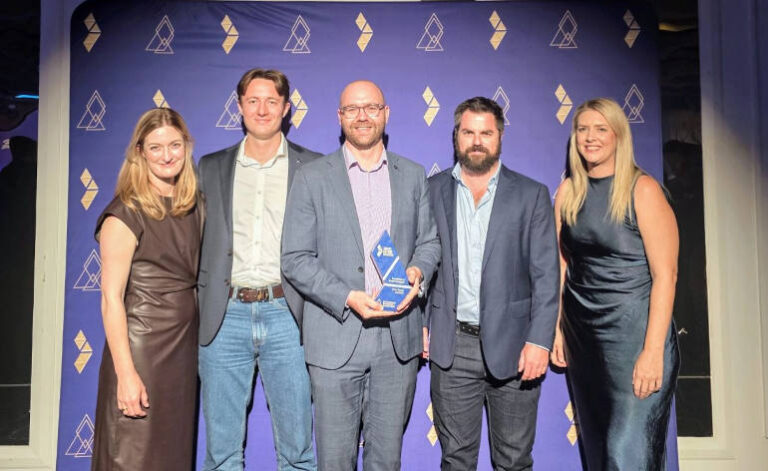Volvo Group Australia has taken out the “Excellence in Smart Transport” category at the 2025 Smart Energy Council Excellence Awards, announced during the Gala Dinner as part of the Smart Energy Expo in Sydney.
Speaking with Fleet News Group after the win, Tim Camilleri, Director E-Mobility Solutions at Volvo Group Australia, described the award as recognition for Volvo’s holistic approach to driving industry change. “It was good competition… but the message that we proposed was around what we have changed in this space, and looking to lead the area in terms of industry change and considering it holistically, rather than transactionally,” he said.
The Excellence in Smart Transport category was highly contested, with other finalists including Zenobe, Chargefox, Janus Electric, and RAA Charge. Camilleri pointed to Volvo’s cross-functional commitment to electrification—from internal departments to industry partnerships and customer collaboration—as a standout factor in the judging process. “That narrative or that way of working is very important, and the opportunity we have to—pardon the pun—plug into the ecosystem.”
Volvo’s efforts reflect more than just vehicle sales. Camilleri stressed the importance of integrating electric trucks into a broader energy ecosystem: “We can put electrons through a charger, into a truck and on we go, but… how we can play our part in receiving electrons as an electronic ecosystem is an important one that we want to showcase.”
Since launching its heavy-duty electric truck range at the 2023 Brisbane Truck Show, Volvo has made significant strides in deploying electric vehicles across various Australian applications. “We have done a lot of good work… a lot of good volume announced in pipeline,” said Camilleri, while noting there’s still much more to achieve to meet the nation’s emissions reduction targets. “We do need to keep on doing more. We need to move the needle faster and bigger.”
Australia was among the first countries outside Europe to receive Volvo’s electric trucks, which Camilleri described as “a great accomplishment” for the local market. The next major step is to bring production onshore. The company is still on track to begin local manufacturing of electric trucks at its Wacol factory in Brisbane by late 2027.
“It’ll be a very momentous occasion to see the first electric Volvo prime mover built here in Australia, in Wacol… alongside the internal combustion engine products that have been there for 53 years,” he said.
Part of what sets Volvo apart is its insistence on ensuring the right vehicle is matched to the right task—especially critical for electric trucks. “They’re not show ponies. They need to be workhorses. They need to do the job they’re required to do,” Camilleri said.
This pragmatic, customer-first philosophy has become a core pillar of Volvo’s e-mobility rollout. The company works closely with fleets to conduct detailed assessments before any trucks are delivered. “There should be no need to deploy the wrong truck into the wrong application. That doesn’t do the partnership right at all.”
The brand’s three-pronged strategy includes continuing to improve internal combustion engines, investing in gaseous fuel solutions including hydrogen, and advancing electric and fuel cell technology—ensuring it has the right solution for every application.
Camilleri hinted that more announcements are coming as Volvo expands its work with partners to trial electric trucks across new industries and duty cycles. “We’re always looking to push the boundaries… not going to sit around and keep doing what we’ve always done. That’s core business. But how else can we explore this and get the most out of this technology change?”
The award serves as a milestone for Volvo Group Australia, highlighting its role in shaping a smarter, cleaner transport future—driven by collaboration, innovation, and a firm commitment to sustainable mobility.





